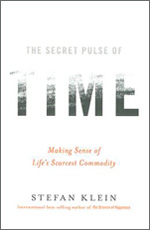We are slaves of clock time, used to working under pressure and trying to meet our deadlines. We speak of "having" and "saving" and "wasting" time but we never quite succeed in conquering it. While we are rushing around frantically, the brain creates its own inner time and that is what makes all the difference in the world, according to Stefan Klein, one of Europe's leading science journalists and writers. In this enlightening and robust examination of the secret pulse of time, he presents a treasure trove of fascinating material and scientific data. Here are some of the topics that most interested us:
• Why there are morning people and night people
• Why so many people wait until the last possible minute to finish everything
• Why time passes so quickly when you are having fun
• Why people are so obsessed with their email
• How the present becomes memory
• Why the way back is always shorter
• Why it is so difficult to stay focused
"Time is the element in which we exist," novelist Joyce Carol Oates has observed. "We are either borne along with it or drowned in it." All of us feel the urgency of time, and for many of us, this means we must deal with stress and hurry sickness. Klein states:
"The film of our lives originates in our heads, and we are the directors, because the so-called sense of time is one of the most malleable functions of the brain. Nature has programmed our minds to register the passage of minutes and hours, but how we do so is up to us. By schooling our own perception and focus, our sense of time can be transformed. We can let go of our fear of drowning in the maelstrom of time and learn to swim."
Here are some ways to heed your inner rhythm of time. Try tai chi to alter your sense of time. Do what you love to do, and time will speed up. As Pliny the Younger wrote in the first century, "The happier the time, the more quickly it passes." Find and practice an equivalent of the Japanese tea ceremony where you can live fully in the present moment. Bring your senses alive by heightened perception. Harvest your memories and make them into positive moments of reverie. Take control of your time by seeing it as a pleasure and not as a stress-inducing pressure.
Klein closes with six steps to a more relaxed life: achieve sovereignty over time, live in harmony with your biological clock, cultivate leisure time, experience the moments, learn to concentrate, and set priorities.
